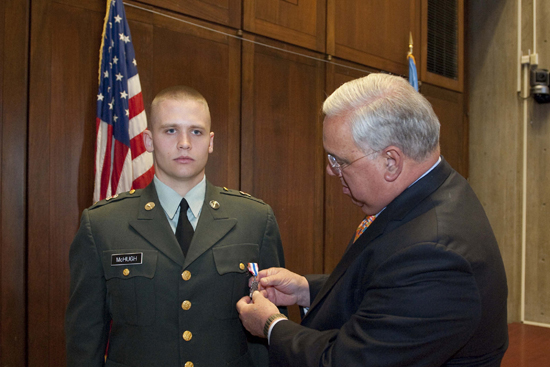ROTC Cadet Awarded for Action in Allston
Sophomore intervenes in street fight

Timothy McHugh insists that he’s not a hero. The very idea makes him uncomfortable he says. He hates public speaking, gets nervous in front of crowds, and breaks out in red splotches when he thinks about award ceremonies.
So it was less than 100 percent pleasant for McHugh to stand before a group of people, family and Army officers, on May 7, while Boston Mayor Thomas Menino (Hon.’01) pinned a red, white, and blue ribbon, hung with a medallion engraved “For Heroism,” on his uniform. In a ceremony in the mayor’s City Hall office, McHugh was awarded the Reserve Officers’ Training Corps (ROTC) Medal for Heroism, one of the highest honors within the corps. The U.S. Army ROTC cadet is one of only seven officers-in-training in the past three years to receive this nationwide honor, and the only BU cadet ever to have received it, according to Major William Laase, the former BU Army ROTC recruiting operations officer and assistant professor of military science.
McHugh (CGS’10), a former Weymouth high school wrestler and football player, intervened (and was himself a victim) last year in a late-night domestic fight on an Allston street. His actions, officials said, prevented what could have been a more serious assault and forced the attacker to face his own demons.
“It’s nothing compared to what soldiers in Iraq and Afghanistan have done,” McHugh says. “Compared to that, I don’t feel like a hero at all.”
 McHugh, blue-eyed and with his hair in a buzz cut, nurses an iced coffee while telling his story. He had just visited a friend on Brighton Avenue and was walking back to his South Campus dorm when he glanced down a side street and saw a man beating a woman.
McHugh, blue-eyed and with his hair in a buzz cut, nurses an iced coffee while telling his story. He had just visited a friend on Brighton Avenue and was walking back to his South Campus dorm when he glanced down a side street and saw a man beating a woman.
He paused for a second to make sure it wasn’t a couple of drunken jokesters, then called 911. Just then the woman broke free, bolted toward him, and kept going down the avenue.
With the woman crying hysterically, McHugh continued speaking with the dispatcher, glancing back repeatedly to see if the man was following them. Here McHugh pauses in his story. He flashes a shy grin, because what follows is “kind of embarrassing, he says. Without warning, the attacker pulled up near them in his car and threw himself at McHugh, landing a punch on the side of his head and laying him out on the sidewalk. The man continued to berate the woman. Both husband and wife were drunk; neither paid attention as McHugh stayed on the phone.
Within minutes, several Boston police officers arrived and arrested the man. McHugh told the cops his story and agreed to press assault charges.
Ultimately, two cases were brought against the man — one in the wife’s name and the other in McHugh’s. But the woman refused to testify, and her case was dismissed.
“Too often I see victims of domestic violence come in badly beaten and upset and ready to testify and by the outset of the trial they don’t show up,” says John Seed, a Suffolk County assistant district attorney and supervisor of the Brighton Court.
McHugh persisted with his own case, however, and his attacker was placed on probation for nine months, required to attend anger and alcohol management counseling, and ordered to write McHugh a letter of apology.
“If I didn’t have Tim McHugh, I wouldn’t have gotten what I did,” says Seed. “Cases like this often lead to a pattern of abuse in people. If we didn’t have someone to step in, this might have been a recurring theme.”
Grateful for McHugh’s help, Seed wrote a letter to U.S. Army Lt. Col. Scott Williams, chairman of BU’s department of military science. Word of McHugh’s good deed soon reached the U.S. Army Cadet commanding general, who awarded him a Medal for Heroism.
Months after the incident, McHugh credits the ROTC program for teaching him to “think on his feet.”
Leslie Friday can be reached at lfriday@bu.edu; follow her on Twitter at @lesliefriday.
Comments & Discussion
Boston University moderates comments to facilitate an informed, substantive, civil conversation. Abusive, profane, self-promotional, misleading, incoherent or off-topic comments will be rejected. Moderators are staffed during regular business hours (EST) and can only accept comments written in English. Statistics or facts must include a citation or a link to the citation.